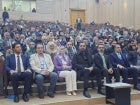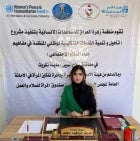Breadcrumb
Stories
Topic
- Ending violence against women and girls (41)
- Gender equality and women’s empowerment (31)
- Economic empowerment (29)
- Peace and security (18)
- Humanitarian action (15)
- Partnerships (13)
- UN Security Council resolution 1325 (12)
- Governance and national planning (10)
- Leadership and political participation (9)
- Health (8)
- Political empowerment (8)
- Education (6)
- Crisis response and recovery (5)
- Peacebuilding (5)
- Civil society (4)
- Conflict, war (4)
- Migration (4)
- Campaigns (3)
- Communications and media (3)
- Domestic violence/interpersonal violence (3)
- Executive Director (3)
- Gender, culture and society (3)
- Governance (3)
- National planning (3)
- Rape/sexual assault (3)
- Sustainable Development Goals (SDGs) (3)
- Youth (3)
- Adolescents (2)
- Capacity development (2)
- Civil society participation (2)
- Decision-making (2)
- Gender equality and inequality (2)
- Generation Equality (2)
- Girls (2)
- Government contributors (2)
- HIV and AIDS (2)
- Innovation and technology (2)
- Local development (2)
- Peace processes (2)
- Rural women (2)
- Schooling (2)
- Sexual harassment (2)
- Trafficking/sexual exploitation (2)
- 2030 Agenda for Sustainable Development (1)
- Access to justice and legal protection (1)
- Access to justice post-conflict (1)
- Beijing Platform for Action (1)
- Businesses and foundations (1)
- Citizen engagement (1)
- Coordination, knowledge management (1)
- COVID-19 (1)
- Electoral systems and processes (1)
- Employment (1)
- Environmental protection (1)
- Gender discrimination (1)
- Harmful practices (1)
- Human rights (1)
- Information and communications technology (ICT) (1)
- Intergovernmental processes (1)
- Maternal health (1)
- Mediation and conflict resolution (1)
- Millennium Development Goals (MDGs) (1)
- New media (1)
- Productive resources (1)
- Rural development (1)
- Science and technology for development (1)
- Service delivery (1)
- Sexual violence in conflict (1)
- Temporary special measures, affirmative action (1)
- Truth and reconciliation (1)
- Universal primary education (1)
- UN Security Council resolutions (1)
- UN Women administration (1)
- Women with disabilities (1)
- Women’s movements (1)
Country
- Iraq (188)
- Syrian Arab Republic (5)
- Jordan (3)
- Lebanon (3)
- Egypt (2)
- Morocco (2)
- Peru (2)
- Türkiye (2)
- Yemen (2)
- Algeria (1)
- Bahrain (1)
- Bangladesh (1)
- Brazil (1)
- Croatia (1)
- Dominican Republic (1)
- El Salvador (1)
- Ireland (1)
- Libya (1)
- Moldova, Republic of (1)
- Mozambique (1)
- Nepal (1)
- Nicaragua (1)
- Palestine, State of (1)
- Rwanda (1)
- Serbia (1)
- Sweden (1)
- Switzerland (1)
- Tajikistan (1)
- Tanzania, United Republic of (1)
- Timor-Leste (1)
- Tunisia (1)
- Uganda (1)
- Ukraine (1)
- United Arab Emirates (1)
Pagination
Baghdad, Iraq – 5 February 2025 – The National Directorate for Iraqi Women, in collaboration with UN Women, convened a high-level consultation session with 75 representatives from civil society organizations (CSOs) and the Government of Iraq to advance the Women, Peace, and Security (WPS) agenda and support the development of Iraq’s third National Action Plan (INAP III).
On Thursday, January 23, 2025, the Kirkuk Governorate, in partnership with UN Women and the United Nations Assistance Mission for Iraq (UNAMI), hosted a landmark Women, Peace, and Security (WPS) event at the Kirkuk Governorate building. The event brought together nearly 200 participants, including civil society leaders, activists, senior government officials, and representatives of United Nations agencies, to reaffirm their commitment to advancing women’s roles in governance, peacebuilding, and society.


















